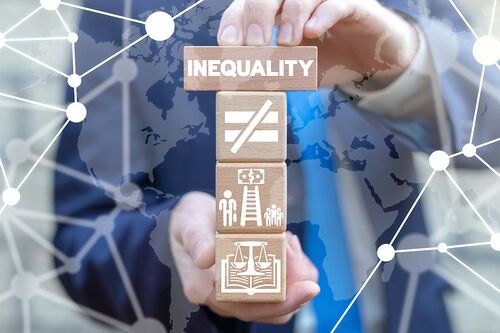In early December, 2021 the Irish National Organisation of the Unemployed (INOU) made a submission to the consultation on the Review of the Equality Acts being undertaken by the Department of Children, Equality, Disability, Integration and Youth.
The INOU welcomed the acknowledgement on the Department’s website of “The Programme for Government commitments on the introduction of a socio-economic ground for discrimination and the amendment of the gender ground will be considered as part of the review.”
In his speech to the 17th Annual Civil Society Forum on Human Rights (linked here), President Michael D Higgins noted that “The economic and social rights enumerated in Articles 22 to 27 of the Universal Declaration – the right to work, to protection against unemployment, to join trade unions, to holidays and leisure, and most radically, to an adequate standard of living – all demand collective action, and a role for the State, to be both secured and provided.”
The Central Statistics Office (CSO) statistical release (linked here), using Labour Force Survey data from Quarter 1 2019, explored respondents experience of equality and discrimination and observed that “Experiencing both types of discrimination – Workplace discrimination and discrimination in Accessing services – was reported by just 3.5% of persons aged 18 years and over. Over one in ten (10.8%) of unemployed persons experienced both types of discrimination.”
In the same release the CSO also noted that “Persons who experienced Workplace discrimination were predominantly from the following groups:
- Unemployed (24.6%)
- Non-white ethnic backgrounds (19.8%)
- Persons who identify as LGBTI+ (17.5%)
- Non-Irish (14.4%)
- Persons with a disability (12.3%)
- Persons aged 25 to 44 years (11.0%)
- Females (10.6%) compared to 8.2% of males
As Ireland’s equality legislation stands, the group with the highest rate of Workplace discrimination, the unemployed, could not use this legislation to address their experience of discrimination. The only way an unemployed person could use any of the redress mechanisms under the equality legislation is if they felt that they had been discriminated against on any of the existing grounds, for example, their age, their ethnicity or that they had a disability.
The Department posed six questions/themes for this consultation process, the INOU submission covered all of them with a particular focus on the need to incorporate the ground of socio-economic status into Ireland’s equality legislation as a matter of urgency.
In a letter to the Joint Committee on Justice and Equality, in 2018 the Economic, Social and Cultural Rights Initiative stated that “On the 19th June, 2015 the United Nations Committee on Economic Social and Cultural Rights published their concluding observations on Ireland’s report (ref: E/C.12/IRL/CO/3). On the issue of ‘non-discrimination’ (Article 2.2) the Committee recommended “that the State party adopt comprehensive anti-discrimination legislation that includes all the grounds for discrimination set out in article 2, paragraph 2, of the Covenant.” A development that member organisations welcomed at the time as issues like unemployment are not covered by Ireland’s equality legislation. There has, unfortunately, been a lack of movement on this important recommendation.”
In the Equality Rights Alliance’s report (.pdf linked here), An analysis of the introduction of socio-economic status as a discrimination ground, chapter 7 explores Defining a socio-economic status ground. In this chapter the report notes “Many countries stipulating a socio-economic status ground do not provide a specific definition for the ground. However, given the number of different categories used it is advisable to offer a definition or a number of indicators to avoid incertitude. The 2004 report in Ireland lists a number of possible key indicators to define socio-economic status, such as level of education, level of literacy, homelessness, geographical location, source and level of income, type of work or profession, and employment status. These indicators are still valid and can be used in defining this ground.”
Further on in the report “It is suggested that the definition of a socio-economic status ground could be built by taking into account all the above elements to ensure that it follows an asymmetric approach and enables a situation-specific analysis, responding to disadvantages in the fields of: Economic and financial means, Education, Employment, Family background, Health, Housing, including the geographic location, and Social class.”
In our work with other CVS organisations on the issue of socio-economic exclusion a number of issues arise regularly, including address, accent, how people look, how they dress, the schools they went to, the type of accommodation they live in, whether or not they are employed. In keeping with the experiences of people from ethnic minorities, people facing socio-economic discrimination often experience it at both an individual, familial and communal level. This in turn impacts on peoples experiences of a range services and opportunities including education, health, economic and social services. There is a well-established correlation between educational status and employment status.
Many organisations whose issue of concern is covered by the existing grounds have raised serious concerns about the impact of the exemptions the State currently enjoys under Section 14 of the Equal Status Act. In particular the situation whereby other primary legislation takes precedence over “an Act (linked here) to promote equality and prohibit types of discrimination, harassment and related behaviour in connection with the provision of services, property and other opportunities to which the public generally or a section of the public has access, to provide for investigating and remedying certain discrimination and other unlawful activities”.
It is critical that the State is seen to and abides by its own equality legislation, that it plays a leading and active role in addressing socio-economic discrimination, inequality, and exclusion. This will be particularly important for people who experience discrimination because of their socio-economic status, as the State is a key player in their lives.
To read the full submission please follow this link (linked here)
